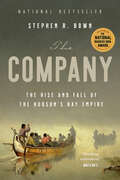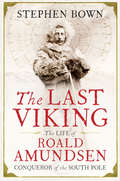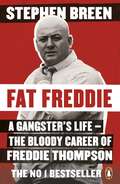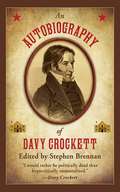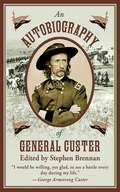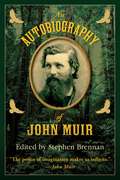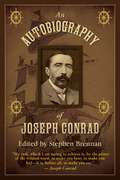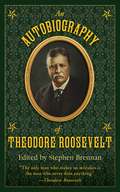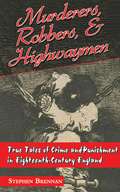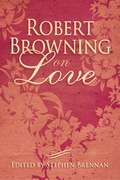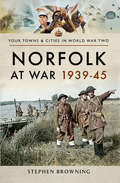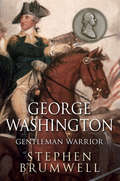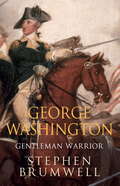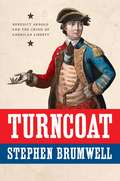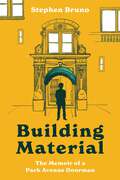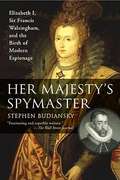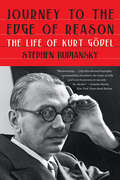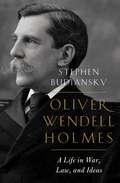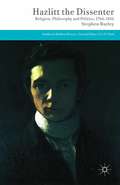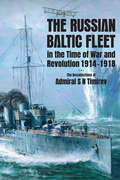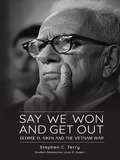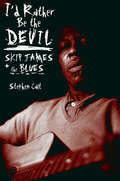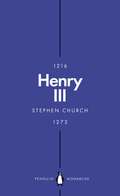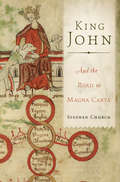- Table View
- List View
The Company: The Rise and Fall of the Hudson's Bay Empire
by Stephen BownA thrilling new telling of the story of modern Canada's origins.The story of the Hudson's Bay Company, dramatic and adventurous and complex, is the story of modern Canada's creation. And yet it hasn't been told in a book for over thirty years, and never in such depth and vivid detail as in Stephen R. Bown's exciting new telling. The Company started out small in 1670, trading practical manufactured goods for furs with the Indigenous inhabitants of inland subarctic Canada. Controlled by a handful of English aristocrats, it expanded into a powerful political force that ruled the lives of many thousands of people--from the lowlands south and west of Hudson Bay, to the tundra, the great plains, the Rocky Mountains and the Pacific northwest. It transformed the culture and economy of many Indigenous groups and ended up as the most important political and economic force in northern and western North America.When the Company was faced with competition from French traders in the 1780s, the result was a bloody corporate battle, the coming of Governor George Simpson--one of the greatest villains in Canadian history--and the Company assuming political control and ruthless dominance. By the time its monopoly was rescinded after two hundred years, the Hudson's Bay Company had reworked the entire northern North American world.Stephen R. Bown has a scholar's profound knowledge and understanding of the Company's history, but wears his learning lightly in a narrative as compelling, and rich in well-drawn characters, as a page-turning novel.
The Last Viking: The Life of Roald Amundsen, Conqueror of the South Pole (A\merloyd Lawrence Book Ser.)
by Stephen BownThis “fascinating biography” of the Norwegian explorer who beat Robert Scott to the South Pole is “intelligent and often thrilling” (London Sunday Times).The most feted explorer of his generation, Roald Amundsen counted the discovery of the Northwest Passage, in 1905, as well as the North Pole amongst his greatest achievements. His revolutionary approach to technology transcends polar and nautical significance. However, until now, his story has rarely featured as more than a footnote to Scott’s tragic failure.Reviled for defeating Scott but worshipped by his men, Amundsen was pursued by women and creditors throughout his life before disappearing on a mission to rescue an Italian explorer attempting to claim the North Pole for Mussolini. The Last Viking is the life of a visionary and a showman, who brought the era of Shackleton to an end, put the newly independent Norway on the map, and was the twentieth century’s brightest trailblazing explorer.
Fat Freddie: A gangster’s life – the bloody career of Freddie Thompson
by Stephen BreenThe No 1 Bestseller'A fascinating read' Seán O'Rourke, RTÉ Radio One'Fat' Freddie Thompson first appeared in court in 1997. He was sixteen and already aspiring to be a major crime boss. Over the next twenty years his criminal career would be marked by mayhem, brutality and murder.In 2000 a row over a failed drugs deal ignited a murderous feud in Dublin's south inner city. The Crumlin-Drimnagh feud's first victim was a friend of Thompson's and he led his Crumlin crew in a series of tit-for-tat killings. Sixteen young men would lose their lives over the next fifteen years.Meanwhile, childhood friend, Daniel Kinahan, had become a senior figure in his father Christy Kinahan's international crime cartel. Working with the Kinahan Cartel Thompson launched himself as a drugs dealer in Dublin. When another deadly feud broke out in 2016 - between the powerful Kinahans and veteran Dublin criminal, Gerry 'The Monk ' Hutch - Thompson was ready to get his hands dirty. But Thompson's loyalty would be his undoing. In August 2018 he was convicted of murder and jailed.Fat Freddie is a gripping account of the rise and fall of Freddie Thompson. Award-winning crime journalist, Stephen Breen, co-author of the No 1 bestselling The Cartel, has written the definitive portrait of a notorious Dublin gangster, a shocking story of double-crossing, vengeance and murder.
An Autobiography of Davy Crockett
by Stephen BrennanBased in part on Davy Crockett's own writings, this is the true story about one of America's most iconic historical figures. From his days as a scout for Andrew Jackson during the war of 1812, his time as a Congressman for the state of Tennessee, and his eventual death at the Alamo, Davy Crockett led a life that was admired and idealized by people all across America, to this very day. Read about the monopolist and corporate misdeeds, environmental degradation, and foreign military adventures that he experienced during his amazing life. Illustrated with drawings and photos, discover the rich history-part myth and part fact-behind this great American man.
An Autobiography of General Custer
by Stephen BrennanTaken from George Armstrong Custer's own writings, An Autobiography of General Custer is the "true story" of one of the most praised, most despised, but surely most remembered American military heroes. Indeed, few figures in our history were--in their own time, as well as in our own--so wildly cheered and so roundly hated.Custer's narration takes us from just after the Civil War, when, having gained a reputation as a bold and inventive leader of the cavalry, Custer was given command of an expedition to help subjugate the Native Peoples of the Great Plains and to force them onto reservations. His story touches on his own court martial and subsequent reinstatement to command. It ends shortly before he embarks upon the campaign that would eventually lead to the Battle of the Little Bighorn and "Custer's Last Stand." As Custer was unable to write about his most famous battle, the Autobiography concludes with an 1880s newspaper account of an interview with Sitting Bull himself after his escape to Canada, in which the great Chief looks back on the battle and offers his own point of view.In the evenings, on post and during his various leaves, Custer would sit at the dining room table with his beloved wife, Libby, and together they would compose the various stories of his exploits that would eventually become the book My Life on the Plains, which was a bestseller in its time, and from which this autobiography is largely taken.
An Autobiography of John Muir
by Stephen BrennanBiographer Steven J. Holmes once wrote that John Muir was "one of the patron saints of twentieth-century American environmental activity." In his lifetime, the engineer, author, biologist, and activist worked alongside powerful men such as President Theodore Roosevelt, railroad executive E. H. Harriman, and conservationist Gifford Pinchot. Muir was responsible for the creation of the Sierra Club and he played an important role in preserving the Yosemite Valley and Sequoia National Park.During his lifetime, Muir published six different volumes of nature and personal writing. After his death in 1914, four more volumes were discovered and released. In An Autobiography of John Muir, editor Stephen Brennan brings to light the many accomplishments of Muir's life through the naturalist's own nonfiction works, including The Story of My Boyhood and Youth and My First Summer in the Sierra.Through the essays featured in this book, readers will learn of Muir's childhood, which was split between Scotland and a farm in Wisconsin. They will travel the world with him, from the High Mountains to the Mono Trail, the Bloody Canyon, Yosemite, and everywhere in between.
An Autobiography of Joseph Conrad
by Stephen BrennanHeart of Darkness author Joseph Conrad (born Józef Teodor Konrad Korzeniowski in 1857) was a Polish writer who learned to read, write, and speak English after he was granted British nationality in 1886. Although his peers accepted him as a British gentleman, he never forgot where he came from. In fact, the history of his native land of Poland often inspired the short stories and novels he penned. Those details, along with the experience he'd had since moving to Great Britain, found their way into many of his published works.In An Autobiography of Joseph Conrad, editor Stephen Brennan has selected pieces from some of Conrad's better known nonfiction works-including The Mirror of the Sea (1906) and A Personal Record (1912)-to showcase some of the more exciting and trying times in the novelist's life. Readers will attend school with Conrad in Russian Poland, sail with him in Marseille, and meet family members who took part in his upbringing, such as Uncle Tadeusz.Portraits of Conrad throughout the years, in addition to photos of his town, home, and family, supplement the text and help readers envision the author and his surroundings during various stages in his life.
An Autobiography of Theodore Roosevelt
by Stephen BrennanBased in part on his own writings, this is the true story about one of America's most beloved leaders. From president of the board of New York City Police Commissioners, secretary of the Navy, founder of the Rough Riders during the war with Cuba, his time as the governor of New York, to vice president and eventually, after the assignation of President McKinley, becoming the twenty-sixth president of the United States, Theodore Roosevelt's role in the shaping of the United States is still felt today. Illustrated with drawing and photos, discover the rich history of this great man's life here.
Murderers, Robbers & Highwaymen: True Tales of Crime and Punishment in Eighteenth-Century England
by Stephen BrennanDespite the frequency with which criminals were sentenced to death, crime was still on the rise in England in the mid-1700s. Men were thrown in jail daily for everything from associating with gypsies to cutting down fruit trees and stealing sheep. Although these were punishable offenses, the crimes that made headlines in the local papers were much more serious.Men--and sometimes even women--in England were tried and executed every day for their roles in murders, robberies, kidnappings, and more. This collection features some of the most notorious and slightly disturbing stories of the crimes committed and the subsequent punishments assigned. Criminals who appear in this book include:Catherine Hayes, burnt alive for the murder of her husbandThomas Lympus, executed for robbing the mailReverend Wheatley, sentenced to public penance for adulteryJohn Everett, sentenced to death for highway robberyFrancis Smith, condemned to death for the murder of a supposed ghostRichard Turpin, executed for horse theftAnd many, many moreMany of these tales were first published in The Newgate Calendar, a popular publication that debuted in multiple volumes between the eighteenth and nineteenth centuries. Historians believed that every household had a copy of at least one volume of the Calendar, which they stored alongside their copies of the Bible and The Pilgrim's Progress.
Robert Browning on Love
by Stephen BrennanThe love affair between Robert Browning and Elizabeth Barrett is one of the Victorian era’s most famous romances. It was one of passions, tragedy, illness, and ultimately, endurance. The beginning of their relationship was luckily documented and preserved via their letters, which have been archived at Wellesley College since 1930. While these exchanges are some of the most popular reads for Victorian literature enthusiasts, Robert had more to say about the abstract idea of love. He continued to express his thoughts and feelings on the subject of romance, marriage, familial love and respect, unrequited love, loving thyself, and even friendship. Robert Browning On Love conveniently collects these thoughts, which have been previously published in Browning’s poems, plays, and, of course, his letters to his beloved wife, Elizabeth. These include: "Best be yourself, imperial, plain, and true. ” "Take away love and our earth is a tomb. ” "I was made and meant to look for you and wait for you and become yours forever. ” "Love, hope, fear, faith--these make humanity; these are its sign and note and character. ”
Norfolk at War, 1939–45 (Your Towns And Cities In World War Two Ser.)
by Stephen BrowningThis year-on-year study of Norfolk at war is the first such for many years, which utilizes material that has not been published in book form before or, sometimes, at all. In both the First and Second World War, Norfolk was pivotal, albeit for different reasons. During the war of 1939-45 Norfolk was home to many bases of the USAAF, changing the area forever with bases remaining a fond feature of Norfolk life. Another unique and enduring legacy was the arrival and often permanent settlement of many Poles, who are commemorated today by a shrine in the Cathedral of St John the Baptist in Norwich. Norfolk was in many ways changed forever as it had largely, up until this time, been proudly, even stubbornly, isolated a feature that could not have changed more dramatically. This study is both inevitably a military and social study. The major events both at home and overseas are laid out, together with a description of how home life unfolded in very dark times when the stoicism and humor of the Norfolk residents were tested. Contemporary material from newspapers, diaries and local records, as well as over 200 photographs, are used to bring life and color and life to the account.
George Washington: Gentleman Warrior
by Stephen BrumwellWinner of the prestigious George Washington Book Prize, George Washington is a vivid recounting of the formative years and military career of "The Father of his Country," following his journey from brutal border skirmishes with the French and their Native American allies to his remarkable victory over the British Empire, an achievement that underpinned his selection as the first president of the United States of America. The book focuses on a side of Washington that is often overlooked: the feisty young frontier officer and the early career of the tough forty-something commander of the revolutionaries' ragtag Continental Army.Award-winning historian Stephen Brumwell shows how, ironically, Washington's reliance upon English models of "gentlemanly" conduct, and on British military organization, was crucial in establishing his leadership of the fledgling Continental Army, and in forging it into the weapon that secured American independence. Drawing on a wide range of sources, including original archival research, Brumwell brings a fresh new perspective on this extraordinary individual, whose fusion of gentleman and warrior left an indelible imprint on history.
George Washington: Gentleman Warrior
by Stephen BrumwellWINNER OF THE GEORGE WASHINGTON BOOK PRIZE 2013.'I am a warrior'. These were the uncompromising words that George Washington chose to describe himself in May 1779, at the height of the Revolutionary War against Britain. It's an image very different to the one that he's been assigned by posterity - the patriotic plantation owner who would become the dignified political leader of his country. Stephen Brumwell's new book focuses on a side of Washington that is often overlooked: the feisty young frontier officer and the tough forty-something commander of the revolutionaries' Continental Army. It examines Washington's long and chequered military career, tracing his evolution as a soldier, and his changing attitude to the waging of war. Brumwell shows how, ironically, Washington's reliance upon English models of 'gentlemanly' behaviour, and on British military organisation, was crucial in establishing his leadership of the fledgling Continental Army, and in forging it into the weapon that won American independence. George Washington is a vivid recounting of the formative years and military career of 'The Father of his Country', following his journey from brutal border skirmishes with the French and their Indian allies to his remarkable victory over the British Empire, an achievement that underpinned his selection as the first president of the United States of America. Drawing on a wide range of sources, including original archival research, Stephen Brumwell paints a compelling and challenging portrait of an extraordinary individual whose fusion of gentleman and warrior left an indelible imprint upon history.
George Washington: Gentleman Warrior
by Stephen BrumwellWINNER OF THE GEORGE WASHINGTON BOOK PRIZE 2013.'I am a warrior'. These were the uncompromising words that George Washington chose to describe himself in May 1779, at the height of the Revolutionary War against Britain. It's an image very different to the one that he's been assigned by posterity - the patriotic plantation owner who would become the dignified political leader of his country. Stephen Brumwell's new book focuses on a side of Washington that is often overlooked: the feisty young frontier officer and the tough forty-something commander of the revolutionaries' Continental Army. It examines Washington's long and chequered military career, tracing his evolution as a soldier, and his changing attitude to the waging of war. Brumwell shows how, ironically, Washington's reliance upon English models of 'gentlemanly' behaviour, and on British military organisation, was crucial in establishing his leadership of the fledgling Continental Army, and in forging it into the weapon that won American independence. George Washington is a vivid recounting of the formative years and military career of 'The Father of his Country', following his journey from brutal border skirmishes with the French and their Indian allies to his remarkable victory over the British Empire, an achievement that underpinned his selection as the first president of the United States of America. Drawing on a wide range of sources, including original archival research, Stephen Brumwell paints a compelling and challenging portrait of an extraordinary individual whose fusion of gentleman and warrior left an indelible imprint upon history.
Turncoat: Benedict Arnold and the Crisis of American Liberty
by Stephen BrumwellA historian examines how a once-ardent hero of the American Revolutionary cause became its most dishonored traitor. General Benedict Arnold&’s failed attempt to betray the fortress of West Point to the British in 1780 stands as one of the most infamous episodes in American history. In the light of a shining record of bravery and unquestioned commitment to the Revolution, Arnold&’s defection came as an appalling shock. Contemporaries believed he had been corrupted by greed; historians have theorized that he had come to resent the lack of recognition for his merits and sacrifices. In this provocative book Stephen Brumwell challenges such interpretations and draws on unexplored archives to reveal other crucial factors that illuminate Arnold&’s abandonment of the revolutionary cause he once championed. This work traces Arnold&’s journey from enthusiastic support of American independence to his spectacularly traitorous acts and narrow escape. Brumwell&’s research leads to an unexpected conclusion: Arnold&’s mystifying betrayal was driven by a staunch conviction that America&’s best interests would be served by halting the bloodshed and reuniting the fractured British Empire. &“Gripping… In a time when charges of treason and disloyalty intrude into our daily politics, Turncoat is essential reading.&”—R. R. B. Bernstein, City College of New York &“The most balanced and insightful assessment of Benedict Arnold to date. Utilizing fresh manuscript sources, Brumwell reasserts the crucial importance of human agency in history.&”—Edward G. Lengel, author of General George Washington &“An incisive study of the war and the very meaning of the American Revolution itself…. The defining portrait of Arnold for the twenty-first century.&”—Francis D. Cogliano, author of Revolutionary America
Building Material: The Memoir of a Park Avenue Doorman
by Stephen BrunoFor fans of books like Waiter Rant, and all those who have always wondered how the other half lives, comes this heartfelt, laugh-out-loud memoir from a New York City doorman with astute ears and a penchant for storytellingAs an academically gifted Latino kid growing up in the Bronx, Stephen Bruno’s family had high aspirations for his future. He attended magnet schools and selective academic programs and was on track to realize his potential. But those dreams were derailed when, much to his Mami’s dismay, he followed a girlfriend to Minnesota and a dead-end job. Languishing and unable to get it together, Stephen eventually moved back home. Broke and eager to make a way for himself—and away from the oppressively religious father wreaking havoc on his love life—the affable, easy going, and quick-witted Stephen lands a much-coveted job as a doorman at a high-end building on Park Avenue.Hilarity and drama soon abound as Stephen learns the dos and don’ts of being a doorman for the rich and famous and witnesses the antics going on behind the front entrance of this swanky building. In Building Material, he shares those entertaining tales and introduces an unforgettable cast of characters—from Puerto Rican and Albanian doormen battling it out for turf to quirky one percenters to slimy sugar daddies to his peers, both friends and frenemies. Throughout, Stephen offers a glimpse into the unfathomable lives of the residents and a sharp portrait of an everyday man wanting more for himself.Both poignant and laugh-out-loud funny, Building Material is a captivating true tale of class, failure, and redemption—and how to come back swinging—from a gifted young talent.
Her Majesty's Spymaster
by Stephen BudianskyQueen Elizabeth I and England's First Spymaster Sir Francis Walsingham's official title was principal secretary to Queen Elizabeth I, but in fact this pious, tight-lipped Puritan was England's first spymaster. A ruthless, fiercely loyal civil servant, Walsingham worked brilliantly behind the scenes to foil Elizabeth's rival Mary Queen of Scots and outwit Catholic Spain and France, which had arrayed their forces behind her. Though he cut an incongruous figure in Elizabeth's worldly court, Walsingham managed to win the trust of key players like William Cecil and the Earl of Leicester before launching his own secret campaign against the queen's enemies. Covert operations were Walsingham's genius; he pioneered techniques for exploiting double agents, spreading disinformation, and deciphering codes with the latest code-breaking science that remain staples of international espionage.
Journey to the Edge of Reason: The Life Of Kurt Gödel
by Stephen BudianskyThe first major biography of the logician and mathematician whose Incompleteness Theorems helped launch a modern scientific revolution. Nearly a hundred years after its publication, Kurt Gödel’s famous proof that every mathematical system must contain propositions that are true—yet never provable—continues to unsettle mathematics, philosophy, and computer science. Yet unlike Einstein, with whom he formed a warm and abiding friendship, Gödel has long escaped all but the most casual scrutiny of his life. Stephen Budiansky’s Journey to the Edge of Reason is the first biography to fully draw upon Gödel’s voluminous letters and writings—including a never-before-transcribed shorthand diary of his most intimate thoughts—to explore Gödel’s profound intellectual friendships, his moving relationship with his mother, his troubled yet devoted marriage, and the debilitating bouts of paranoia that ultimately took his life. It also offers an intimate portrait of the scientific and intellectual circles in prewar Vienna, a haunting account of Gödel’s and Jewish intellectuals’ flight from Austria and Germany at the start of the Second World War, and a vivid re-creation of the early days of Princeton’s Institute for Advanced Study, where Gödel and Einstein both worked. Eloquent and insightful, Journey to the Edge of Reason is a fully realized portrait of the odd, brilliant, and tormented man who has been called the greatest logician since Aristotle, and illuminates the far-reaching implications of Gödel’s revolutionary ideas for philosophy, mathematics, artificial intelligence, and man’s place in the cosmos.
Oliver Wendell Holmes: A Life In War, Law, And Ideas
by Stephen BudianskyThe extraordinary story of the U.S. Supreme Court’s most influential justice. Oliver Wendell Holmes twice escaped death as a young Union officer in the Civil War when musket balls missed his heart and spinal cord by a fraction of an inch at the Battles of Ball’s Bluff and Antietam. He lived ever after with unwavering moral courage, unremitting scorn for dogma, and an insatiable intellectual curiosity. Named to the Supreme Court by Theodore Roosevelt at age sixty-one, he served for nearly three decades, writing a series of famous, eloquent, and often dissenting opinions that would prove prophetic in securing freedom of speech, protecting the rights of criminal defendants, and ending the Court’s reactionary resistance to social and economic reforms. As a pioneering legal scholar, Holmes revolutionized the understanding of common law by showing how the law always evolved to meet the changing needs of society. As an enthusiastic friend and indefatigable correspondent, he wrote thousands of personal letters brimming with humorous philosophical insights, trenchant comments on the current scene, and an abiding joy in fighting the good fight. Drawing on many previously unpublished letters and records, Stephen Budiansky’s definitive biography offers the fullest portrait yet of this pivotal American figure, whose zest for life, wit, and intellect left a profound legacy in law and Constitutional rights, and who was an inspiring example of how to lead a meaningful life in a world of uncertainty and upheaval.
Hazlitt the Dissenter
by Stephen BurleyHazlitt the Dissenter is unique in providing the first book-length account of Hazlitt's early life as a dissenter. As the first multi-disciplinary account of Hazlitt's early literary career, it provides a new insight into the literary, intellectual, political and religious culture of the late eighteenth and early nineteenth century.
The Russian Baltic Fleet in the Time of War and Revolution, 1914–1918: The Recollections of Admiral S N Timiryov
by Stephen C. EllisThe first English-language edition. “A useful read for anyone interested in early 20th century Russia and naval operations in the Great War.” —StrategyPageRear Admiral S. N. Timiryov, was well placed to make observations on the character of many of the significant commanding officers and also many of the operations of the Baltic Fleet from the beginning of the war in 1914 up to exit from it in 1918. He trained with many of the key figures and shared battle experience with them in the Russo-Japanese War of 1904-05 and the siege of Port Arthur; and he spent a year in Japan as a prisoner of war with a number of them. In his subsequent career in the Navy he had roles which brought him into contact with new recruits as well as with many serving officers, and as the Executive Officer on the imperial yacht Shtandart for some years, he came into contact with senior members of the navy establishment and of the government, including the imperial household. The translation of these memoirs brings an important and authoritative historical source to those interested in Russian or naval history who are unable to access them in the original Russian.“An excellent addition to the historiography of the Imperial Russian Navy during the twilight of its existence. A key resource for scholars of the Baltic Fleet and naval aspects of the Russian Revolution.” —The Northern Mariner “The coverage of Russian operations, command structure dynamics, and their impact on operational capability make it worthy of recommendation.” —Australian Naval Institute
Say We Won and Get Out: George D. Aiken and the Vietnam War
by Stephen C. TerryGeorge D. Aiken, a hillside farmer and a liberal Republican Depression-era Governor, rose to national prominence as a leading GOP U. S. Senator and enduring critic of the Vietnam War from 1962-1975. Aiken’s long-standing friendship with Senate Majority Leader Mike Mansfield, an unheard of political alliance in today’s sharply divided Washington, forged bi-partisan opposition to the war. Aiken was neither “hawk” nor “dove”, but a “wise owl” who spoke his mind forcefully and bluntly to all against the war. He advised President Johnson to declare that the U. S. won the Vietnam War and to get out. Later, Aiken told President Nixon to stop bombing in Cambodia or he couldn’t be elected “dogcatcher.” This is pure Aiken speaking truth to power for ending America’s most controversial war, a common-sense voice that the Nation sorely needs today. This book demonstrates that bi-partisan Senate leadership has worked in the past and must be present in order to solve urgent national problems. Senator Aiken was a catalyst for forging consensus on issues from civil rights to foreign policy by being open-minded to all ideas that would help his constituents. Aiken’s philosophy was always to help people first. He never made decisions based on his party, a lost art in the current political environment. A Senator like George Aiken today would help show how to restore bi-partisanship.
I'd Rather Be the Devil: Skip James and the Blues
by Stephen CaltProviding a clear look into the life of one of the greatest Mississippi bluesmen, this is the first biography of the late Skip James, perhaps the most creative and idiosyncratic of all blues musicians. His 1931 performances of "Devil Got My Woman," "I'm So Glad," and "22-20 Blues" are masterpieces that transcend the genre. Drawing largely on hundreds of hours of conversations with James himself, it paints a dark and unforgettable portrait of a man untroubled by his own murderous inclinations, a man who achieved one moment of transcendent greatness in a life haunted by failure. In doing so, it offers new insights into the nature of the blues, the world in which it thrived, and its fate when that world vanished.
Henry III: A Simple and God-Fearing King (Penguin Monarchs)
by Stephen ChurchHenry III was a medieval king whose long reign continues to have a profound impact on us today. He was on the throne for 56 years and during this time England was transformed from being the private play-thing of a French speaking dynasty into a medieval state in which the king answered for his actions to an English parliament, which emerged during Henry's lifetime. Despite Henry's central importance for the birth of parliament and the development of a state recognisably modern in many of its institutions, it is Henry's most vociferous opponent, Simon de Montfort, who is in many ways more famous than the monarch himself. Henry is principally known today as the driving force behind the building of Westminster Abbey, but he deserves to be better understood for many reasons - as Stephen Church's sparkling account makes clear.Part of the Penguin Monarchs series: short, fresh, expert accounts of England's rulers in a highly collectible format
King John: And the Road to Magna Carta
by Stephen ChurchKing John has long been dubbed one of the "vilest” of English kings. He was brutish, untrustworthy, and ruled as a virtual tyrant--and yet his reign changed the course of English history. As renowned medieval historian Stephen Church argues, John’s importance has for too long been overshadowed by more heroic family members like Richard the Lionhearted and Eleanor of Aquitaine. John was a skilled political manipulator, but his traditional belief in the unchecked power of the sovereign became increasingly unpopular during his reign, leading to frequent confrontations between the king and his barons. In 1215, a group of barons rebelled in response to John’s repressive fiscal policies. The peace treaty that resulted was the Magna Carta, which enshrined the king’s obligation to rule within the framework of the law. King John offers an authoritative portrait of King John and the moment that signaled the end of the age of absolute monarchy and the dawn of constitutional law.
